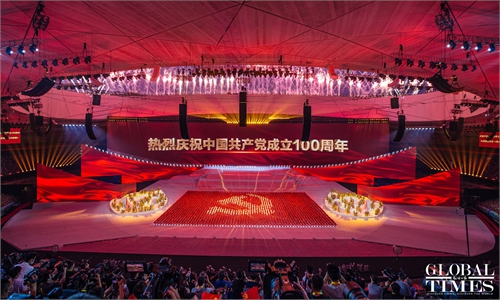
Illustration: Liu Rui/GT
Editor's Note:
The past 100 years have witnessed the how the Communist Party of China (CPC) has risen from scratch to making outstanding contributions and transformations for Chinese people's lives. It is has also been a period with dramatic changes in ties between China and the West. What lies behind these changes? How to make the world understand the CPC? Leading experts from both China and abroad discussed these issues at a webinar themed, "The Past 100 Years: China, the West and the World," co-hosted by the Chongyang Institute for Financial Studies, Renmin University of China (RDCY), and the No Cold War campaign on Wednesday.
Wang Wen, executive dean of RDCY
From the viewpoint of the evolution of civilization, the 100th anniversary is a continuation of the progressive logic of humanity. While most countries and regions experience regression in recent years when faced with rising protectionism, populism, extremism and worsening ecology, China, under the leadership of the CPC, keeps on making progress.
Second, from the viewpoint of national development, the 100th anniversary of the CPC offers an optional promising path of development that other developing countries can learn from.
Third, from the viewpoint of political party organizations, the 100th anniversary of the CPC has promoted a breakthrough and theoretical innovation in political party systems all over the world.
Many political parties have been continuously in power for decades. But few of them are like the CPC - one with a century-long history that is still capable of innovation. And such a party is rare, if any, in the West.
Martin Jacques, non-resident Senior Fellow of RDCY, senior fellow of Department of Politics and International Studies, Cambridge University, author of When China Rules the World
How should we describe this new phase in US-China relations? In the West it is commonly called the new cold war. This is mistaken. I understand why it is popular in the US. They won the Cold War. In fact, it was the last thing they actually won. To call it a new cold war gives the illusion that it is similar to or the same as the first cold war and will end in the same way. None of this is true.
We are witnessing a new kind of competition between China and the US, which is comprehensive in character and embraces a very wide range of issues. The bottom line is which modernity - US or China - will be most effective and beneficial for the world in the twenty-first century.
One country - I believe China - will gain the upper hand, but essential to any settlement will be a new synthesis between China and the US, a new kind of relationship, rather than the knock-out punch which ended the first cold war.
Liu Xin, CGTN Host, China Forum expert (China)
How did the CPC manage to empower one fifth of humanity in a century's time, without adopting "Western liberal democracy?" This is an essential question. For us, this means understanding ourselves better. For others, this means potential solutions, especially for underdeveloped countries. China isn't interested in exporting its ideology, but we shouldn't be shy about sharing our experiences.
There are 95 million Party members in China. Together with generations of their far-sighted counterparts, they have pioneered a "new model for human advancement," a new and uniquely Chinese path to modernization.
Looking into the future, the competition will be keener between socialism and capitalism. We can again draw some inspirations from the experiences and lessons from 100 years of struggle and revolution of the CPC: They who stand higher and see further in history will prevail.
Vijay Prashad, executive director of Tricontinental Institute for Social Research, non-resident Senior Fellow of RDCY (India)
The IMF austerity-privatization model is being challenged by the China proposed Belt and Road Initiative (BRI) investment-development model. For fifty years, the IMF positioned itself as the sole agent of economic development and it promoted neoliberalism as the only policy framework. The BRI offers a choice to countries, with an agenda fashioned around infrastructure investment and human development. The BRI is precisely an outcome of the hundred-year struggle of the CPC to create a rational and practical mechanism to advance the cause of humanity.
Countries such as Argentina, Bolivia, Cuba, Nicaragua, Venezuela, and Peru welcome the options provided to them by the BRI. Soon will come a day when they will not have to go hat in hand to the Paris Club and the London Club and beg for debt relief, or to attend to the whims of the IMF Study Missions which come for a few days and pass judgment on a country.
The CPC is to be felicitated for its immense human achievements within China, especially the abolition of extreme poverty. It is clear that the BRI project is the CPC internationalist mission for its second century.
Margaret Kimberley, editor and senior columnist at Black Agenda Report (US)
It is no exaggeration to say that when we talk about China's relationship with countries referred to as the West, we are now talking about war and peace. Because of unrelenting propaganda from corporate media and politicians, it is understandable that China is viewed as a hostile adversary by millions of people outside of that country.
China is reviled for several reasons, racism being one. The white world cannot imagine itself as being second to any non-white country.
That racism creates jealousy as the failures of American capitalism become more and more obvious. Major cities here are unable to house poor people, who live in encampments in public places. Half of the states chose to deprive the unemployed of additional benefits that they earned.
We now have an inverted situation. China was impoverished while many Americans lived in moderate prosperity. Now Americans live an increasingly precarious existence while China brings an improved quality of life. This is a very dangerous moment.
We can learn from what is called new China and its accomplishments of the last 100 years. Unfortunately we live in a country determined to tear all of that down. And we are left to be fearful of many ominous trends.
Radhika Desai, professor of Department of Political Studies, University of Manitoba (Canada)
The CPC has restored China the economic, cultural and technological centrality it once enjoyed in the world and put a country that only 70 years ago was among the poorest in the world within sight of modest prosperity.
Nowhere is this clearer than in China's success, along with other socialist economies, against the novel coronavirus, while capitalist countries are openly sacrificing lives at the altar of capital and profits, which they have the gall to call livelihoods. What the West really is, and the alternative that the CPC and China under its leadership constitute, has become a life and death question for the oppressed people and peoples of the world.
Yury Tavrovsky, head of the "Russian Dream and Chinese Dream" Research Center of the Izborsk Club, Moscow (Russia)
We already observe formation of a new "Anti-Chinese International" combining the EU, NATO, G-7, QUAD and several individual countries. We can only hope that this new global confrontation will stay within the limits of the Cold War.
"Socialism with Chinese Characteristics" as a new model for human advancement looks like a mortal threat to the West. At the same time it is very attractive to other nations. Yes, China does not export it abroad, does not "baptize" recipients of its credits and development projects. Still I believe that it should be thoroughly studied and learned in other countries including Russia. Socialist ideas are becoming popular again especially among the young people. The Chinese model cannot be copied here. We have different ways of thinking and living. Taking into account the national conditions and characteristics is the heart of the Chinese model. Yet I hope to see "Socialism with Russian Characteristics" in my land some day soon.
Jaya Josie, visiting professor of Zhejiang University International Business School (South Africa)
Socialism's principle is, "from each according to contribution and to each according to work." This principle characterized China's evolution from the time of former leader Deng Xiaoping to the present. As China has developed phenomenally over the past 30 years it has shown how the new democracy can foster innovation, research and development, technological advances and peaceful coexistence at home and internationally.
Building socialism takes time, but with a dedicated and committed communist party leading a new democracy, socialism and an equitable and moderately prosperous society is possible. It will provide a model from which all humanity can benefit.
John Ross, senior fellow of RDCY
Is this latest trend of China-US ties long term or temporary? My view is that it is long term. The reason for this is not China but because of the way the US currently defines its objectives.
Most countries define their goals internally and in relation to themselves - for China it is to achieve "moderate prosperity." But the US defines its goal as to be the most powerful country in the world. This is impossible. For US to be largest economy, China must have less than one quarter of US GDP - China must be poor related to the US.
Chinese people will never accept this, nor should they. Same will exist for India. Only when US abandons this, and accepts real multipolarity, will this change. And that can't change rapidly.



